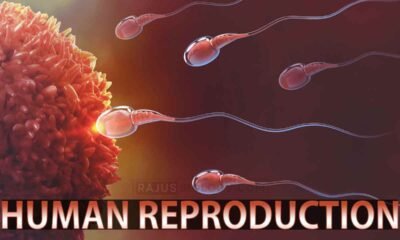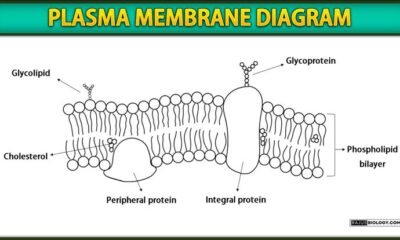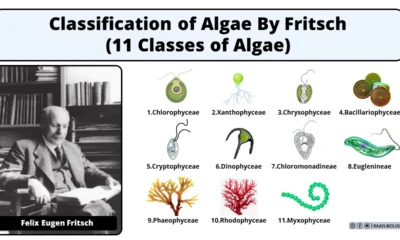Blog
Contribution of Indian Phycologists (4 Famous Algologist)
In this article we will discuss about contribution of indian phycologists (Indian Algologist) :- M.O.Parthasarathy, V.Desikachary, V.Krishnamurthy and V.S.Sundaralingam
Contribution of Indian Phycologists
- Indian phycologists started their work on Algae from 1919 onwards.
- Ghosh( 1919-32) carried out investigation on blue green algae of Punjab
- Later M.O.P Iyengar and his students published a number of papers on algae of South India.
- Contributions of some renowned Indian phycologists are M.O.Parthasarathy, V.Desikachary, V.Krishnamurthy and V.S.Sundaralingam
M.O.PARTHASARATHY
BIOGRAPHY:
- Mandayam Osuri Parthasarathy (M.O.P) Iyengar (1886-1963) was born in Madras.
- He obtained his Bachelor’s and Master’s degrees from the University of Madras.
- He completed his Ph.D. in Botany from the University of London in 1941 under the guidance of renowned phycologist F.E. Fritsch.
- Iyengar worked as a lecturer at the National College, Trichy, and later as a Reader at the University of Madras.
- He served as the Director of the Center for Advanced Studies in Botany at the University of Madras.
- Iyengar was the president of Phycological society of India.
- His work greatly contributed to understanding of algae, their classification, and their ecological significance. That’s why he called as “Father of Indian Algology”.
CONTRIBUTIONS:
- He started his Research in Phycology especially about volvocales.
- He studied freshwater and marine algae, making significant contributions to their taxonomy and classification.
- He discovered new species like Fritschiella, Gilbertsmithia, Ecballocystopsis and Characiosiphon.
- He worked on life history of Cylindrocapsa geminella, Microdictyon tenius.
- He specialized in the study of red algae (Rhodophyta)
- His detailed investigations contributed to the understanding of red algae’s complex life histories and their evolutionary relationships.
- He recognized the significance of algae as indicators of water quality and environmental health.
T.V. DESIKACHARY
BIOGRAPHY:
- Tamarapu Vedanta Desikachary (1919–2003) was born in Tirupati
- Obtained his undergraduate degree from Presidency College, Madras.
- Pursued his Master’s and Doctorate degrees from the University of Madras under the guidance of M.O.P. Iyengar.
- He joined the Botany Department at Presidency College as a lecturer and later became a professor.
- He was a demonstrator at Andhra University and Presidency College.
- He studied microscopic algae and made great strides in both Indian and world plant science.
- Many of his students have become successful Indian phycologists, furthering the field in India.
CONTRIBUTIONS:
- He extensively studied the taxonomy and classification of algae, particularly the green algae (Chlorophyta) and the blue-green algae (Cyanobacteria).
- Developed comprehensive system for the classification and identification of algae.
- His taxonomic system, known as the “Desikachary system,” is widely recognized and used by researchers in the field.
- He proposed a revised classification system for Cyanobacteria based on morphological, physiological, and ecological characteristics.
- Desikachary’s research contributed to the development of algal biotechnology, including the cultivation of commercially important algae for food, feed, biofuel, and wastewater treatment
- Prof. T.V. Desikachary played a vital role in documenting the algal flora of India.
V.KRISHNAMURTHY
BIOGRAPHY:
- Vasudeva Krishnamurthy (1921–2014) was born at Valavanur, Villupuram district
- He completed his education at St. Joseph College in Trichy, where he pursued his Bachelor’s and Master’s degrees in Botany
- He obtained his Ph.D. from the University of Manchester under the guidance of Dr. Kathleen Mary Drew-Baker
- Prof. Krishnamurthy’s research career in algae began during his time at Presidency College in Chennai.
- Throughout his career, Prof. Krishnamurthy held teaching positions at various institutions, including Presidency College, St. Joseph College in Trichy, and Tanjavore Medical College.
- He worked as lecturer in microbiology at Govt. Engineering College in Guindy
CONTRIBUTIONS:
- Prof. Krishnamurthy established marine algal research stations in Mandapam, Tamil Nadu.
- Prof. Krishnamurthy founded the “Seaweed Research and Utilization Association” (International Journal) and served as its Founder-President.
- He also played a pivotal role in the publication of the monographs on Indian Red Algae and Brown Algae
- He collaborating with esteemed algologists Prof. T.V. Desikachary and Dr. M.S. Balakrishnan.
- He published over 138 research papers.
- Krishnamurthy Institute of Algology (1991) has the largest library in Tamil Nadu on algal studies, Prof. V. K. worked in this laboratory until his death.
V.S.SUNDARALINGAM
BIOGRAPHY:
- Vellore Somasundaram Sundaralingam (1918-2011) was born at Thiruchengode
- He completed his Bachelor’s degrees in Botany at Presidency College, Madras.
- He obtained his M.Sc. degree (by research) in Madras University.
- Became a Lecturer in Botany at Pachaiyappa’s College, Madras
- Rose to Professor and Head of the Botany Department at Pachaiyappa’s College
- He served as Vice-Principal of Pachaiyappa’s College
- Appointed Professor at the Centre of Advanced Study in Botany
- Throughout his career, he focused his research on Indian Charophyceae and obtained a Ph.D. degree from Madras University (1961)
- He has authored two books and published numerous research papers on Charophyceae.
CONTRIBUTIONS:
- Pioneered research on Indian Charophyceae, a specific group of green algae.
- Co-authored the ICAR Monograph on Charophyceae, a comprehensive resource on the subject.
- The Krishnamurthy Institute of Algology honored him with the Life-time Achievement Award in Phycology.
Frequently Asked Questions
Algologist meaning?
The study of algae is called phycology or algology. Scientists in this field are called algologists or phycologists.
Who is known as father of indian algology?
M.O.P Iyengar was Indian phycologist, his work greatly contributed to understanding of algae, their classification, and their ecological significance. That’s why he called as “Father of Indian Algology”.
Who is the father of algology in the world?
FE Fritsch is known as ‘Father of algology’ and his student MOP lyenger from Madras University is known as the ‘Father of Indian Algology’.
Other Famous Indian Phycologists?
Y. Bharadwaja is renowned Indian phycologist, His work on the Zygnemataceae, a family of green algae.
M.S. Balakrishnan was a prominent Indian phycologist who made significant contributions to the study of marine algae.
V.G.S. Venkataraman was a leading Indian phycologist who studied a wide range of algal groups, including blue-green algae, green algae, and red algae.

 Blog8 months ago
Blog8 months ago[PPT] Human Reproduction Class 12 Notes
- Blog8 months ago
PG TRB Botany Study Material PDF Free Download

 Blog8 months ago
Blog8 months agoCell The Unit of Life Complete Notes | Class 11 & NEET Free Notes

 Blog8 months ago
Blog8 months ago[PPT] The living world Class 11 Notes

 Blog8 months ago
Blog8 months agoPlasma Membrane Structure and Functions | Free Biology Notes

 Blog8 months ago
Blog8 months agoJulus General Characteristics | Free Biology Notes

 Blog8 months ago
Blog8 months agoClassification of Algae By Fritsch (11 Classes of Algae)

 Entertainment7 months ago
Entertainment7 months agokatmovie 18 Movies and Streaming Experience















